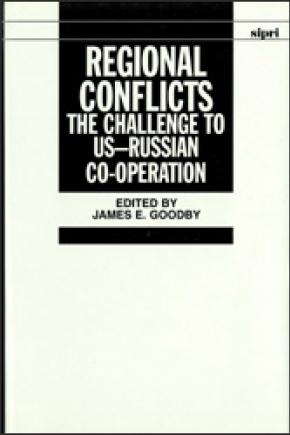Regional Conflicts: The Challenge to US–Russian Co-operation
Regional security issues threaten to end the US–Russian partnership in security affairs before it is truly realized.
Contradictions between the ideas of collective security and spheres of interest already have caused tensions in the partnership. Weapons of mass destruction are more readily available today and therefore regional conflicts potentially are more dangerous than ever. However, the partnership also has encountered difficulties in devising common strategies for dealing with the deadly threat of nuclear proliferation.
If their partnership is to prosper, the two countries will have to work together to create a more predictable international order. This should be based on a better definition of the issues that Russia and the USA see in various types of regional conflict. US–Russian interests are engaged in regional disputes when weapons of mass destruction are a factor or where one or the other has special strategic, economic or historical connections with parties to disputes. There are, of course, many conflicts where neither Russia nor the USA are directly or immediately affected.
A more accurate understanding of how the two countries are likely to respond to regional conflicts will help with the problem of misunderstandings about national interests. The partnership will still be complicated by the inevitable difficulties of communicating when their own military forces come into play. Another factor, the frailties of international security organizations, is both a problem and a challenge for the US–Russian partnership.
Regional organizations that could help to contain or settle disputes are often pitifully unprepared for this. The UN remains the strongest of the organizations that deal with war and peace issues, but it has been stretched to the breaking point. Strengthening regional organizations is an essential but long-term task; US–Russian co-operation within the UN framework must be sustained if the UN is to survive the challenges to it.
Part I. Introduction
1. Introductory remarks
James E. Goodby
Part II. Preventive diplomacy in an era of high technology
2. The potential for US-Russian security co-operation in the developing world
Phil Williams
3. The elements of a North-South security system
Sergey Rogov
4. Containing the introduction of destabilizing military technologies: The confidence-building approach
James Macintosh
5. Controlling the high-technology militarization of the developing world
M. Granger Morgan and Mitchel B. Wallerstein
Part III. Where interests diverge: dilemmas of US-Russian security co-operation
6. Global co-operation and regional conflict: Problems in co-ordinating the US and Russian security agendas
Russell Leigh Moses
7. Post-independence decolonization: A framework for analysing Russia's relations with neighbouring states
John J. Maresca
8. Intervention in the 'new world order': US use of force in Latin America and the Persian Gulf
William W. Newmann
9. Conflict in Europe: The case of Yugoslavia
James E. Goodby
Part IV. International security organizations as instruments for great power co-operation
10. The utility of international organizations for collective action in regional conflicts
James E. Goodby and Daniel B. O'Connor

